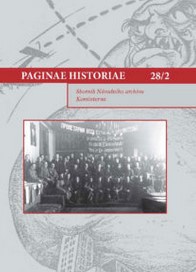LIDOVÁ FRONTA A JEJÍ REÁLNÁ PODOBA V ČESKOSLOVENSKU
THE POPULAR FRONT AND ITS REAL FORM IN CZECHOSLOVAKIA
Author(s): Peter PopálenýSubject(s): Political history, Government/Political systems, Interwar Period (1920 - 1939), History of Communism
Published by: Národní archiv
Keywords: Czechoslovak Communist Party; the Comintern; political history; Popular Front;
Summary/Abstract: In the interwar period, the Czechoslovak Communist Party was one of the stalwart national sections of the Comintern. Despite the large fluctuation in its membership base, it was one of the major Communist parties, and in the early 1930s, together with the French Communists, it was one of the most numerous sections. On the domestic political scene, the Czechoslovak Communists were among the established parliamentary political parties. Especially in the Czech lands, the Communist Party achieved significant results in the parliamentary elections which allowed it to influence and – in particular – destabilize the political scene since the Communist Party undoubtedly represented an anti-systemic party within the First Czechoslovak Republic regardless of the changing intensity of such manifestations. The Communist International and its Moscow leadership had a fundamental influence on the policies of the Czechoslovak Communists. Individual directives and concepts fundamentally influenced the party’s affairs. The concept of the Popular Front was one of the main policies of the party. Interpretation and implementation of this policy was ambiguous and often resulted in contradictory interpretations. In spite of these facts, the Popular Front was in many respects a major turning point but the important fact was that the aim of the dictatorship of the proletariat remained unchanged. Being under the influence of domestic and foreign situation and backed by the Popular Front policy, Czechoslovak Communists in the 1930s managed to gradually address a considerable part of the society. The reason for the success was concealing their anti-systemic attitudes accompanied by populist approach and, last but not least, an appeal to national awareness. The active support of the Popular Front policy and its commitment to the Comintern also made it possible to maintain the favour of the Moscow leadership. The future after World War II demonstrated how effective such an approach was.
Journal: Paginae Historiae
- Issue Year: 28/2020
- Issue No: 2
- Page Range: 143-161
- Page Count: 19
- Language: Czech

